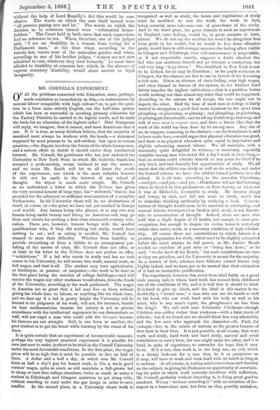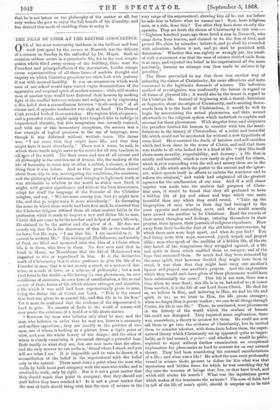MR. CORNELL'S EXPERIMENT.
OF all the problems connected with Education, none, perhaps, needs resolution so immediately as this,—is maintenance by manual labour compatible with high culture ? or, to put the ques- tion in a form more strictly English, can the half-time system which has been so successful in securing primary education for the Factory Districts be carried to its logical result, and be made the basis for an education of the highest order ? Most Europeans will reply, we imagine, that it cannot, and most Americans that it can. If it is true, as many thinkers believe, that the majority of mankind must always be workers with the hands,—a statement supposed by most persons to be self-evident, but open to serious question,—the dispute involves the future of the whole human race, and a serious effort to decide it should excite deep intellectual interest. Mr. Cornell, the gentleman who has just endowed the University in New York State in which Mr. Goldwin Smith has accepted a professorship, seems inclined to test the matter ; and we trust Mr. Smith will let us all know the result of the experiment, one which is the more valuable because it will not be made in the interest of any school of thought. Its object is much more simple. Mr. Cornell, as we understand a letter to which the Tribune has given the very unusual honour of large type, has " endowed," that is, has provided for the adequate or sufficient remuneration of a complete Professorate. In his University there will be no distinctions of creed, of colour, or—the point we have not yet reached in Europe —of wealth. Any human being who pleases, or at any rate any human being under twenty and living on American soil, may go there and obtain for nothing a first-class nineteenth-century edu- cation. There are, however, human beings with the needful qualifications who, if they did nothing but study, would have nothing to eat ; and as eating is needful, Mr. Cornell has essayed to meet their difficulty. Whether from inability to provide everything or from a dislike to an arrangement par- taking of the nature of alms, Mr. Cornell does not offer, or at least in his letter to the Tribune does not profess to offer, "exhibitions." If a lad who wants to study and has no cash comes to his University, he will secure him work, manual work, on full wages, and that is all. The student may turn agriculturist, or bricklayer, or painter, or carpenter,—the work to be done in the first place being the erection of college buildings,—and will receive the wages any other workman would obtain, from the funds of the University, according to the work performed. The wages in America are so great that a lad may live on them without giving his whole time to labour, or anything like his whole time, and we dare say if a lad is pretty bright the University will be lenient in its judgment of his work, will not, for instance, banish its best mathematician because his joinery is not in precise accordance with the intellectual arguments he can demonstrate so well, will not expel a man who could edit the Georgics because his furrows are not straight. Still, in one form or another, the poor student is to get his bread while learning by the sweat of his brow.
• It is quite certain that an experiment of inconceivable moment, perhaps the very highest practical experiment it is possible for men just now to make, is about to be tried in the Cornell University under the most favourable conditions. In the first place, the wages given will be so high that it must be possible to live on half of them. A dollar and a half a day, at which sum Mr. Cornell hints as half a day's pay for honest work, is 30s. a week, good curates' wages, quite as much as will maintain a full-grown lad
in cheap or rent-free college chambers, twice as much as many a student in Edinburgh and Glasgow contrives to get along with, Without standing to read under the gas lamps in order to save candles. In the second place, in a University where work is recognized as well as study, the hours and regulations of study must be modified to suit the work, the work in fact, being essential, must take some sort of precedence of the study. And in the third place, the great obstacle to such an experiment in England, caste feeling, would be, in great measure at least, absent. We do not say the wealthy lad would be altogether free from pride in his wealth, but he would be free from offensive pride, would have in still stronger measure the feeling often visible in Glasgow and Edinburgh, that self-maintenance is respectable, or if not respectable exactly, suggests a doubt whether the lad who can maintain himself and go through a curriculum too will very long "keep down." The shoeblack in New York is not to be kicked, for be may be President ; or the pupil-workman in Glasgow, for the chances are five to one in favour of his becoming a rich man. Given an absence of caste feeling, very high wages, and rules biassed in favour of the system, to see whether hard labour impedes the highest cultivation,—that is a problem better worth working out than almost any other that could be suggested. According to the axioms we all accept, the one ought not to impede the other. Half the time of most men at college is fairly wasted in occupation a good deal more injurious to the mind than ploughing, or plastering, or planing ; and ploughing, or plastering, or planing produces health; and we all say health helps learning, and talk of mens sana in corpore so no, and have a latent idea that the work of the world has been done by its strong men. Any one of us, we suppose, reasoning in the abstract,—as the Scotchman is said to have made love,—would argue that physical education was good, and there is no physical education quite equal to imperative and slightly exhausting manual labour. We all maintain, with a unanimity quite delightful to witness,—a unanimity especially complete among men who never did a day's work in their lives— that an artizan could educate himself to any point he liked he only tried, and had decently fair opportunities of study. We all assert that the athlete can study as well as the scholar, and under the Cornell scheme we have the athlete turned perforce into the school. It is all true, according to the muscular Christians, —and yet,—and yet, —and yet,—Hawthorne did not find farming, when he tried it in that phalanstere, or New Society, or whatever it was at Blithedale, favourable to study. lie became sleepy and heavy, he said, and did not want to think, much less to stimulate thinking artificially by studying a book. Concen- tration of thought would seem to be essential to scholarship, and manual labour, interspersed or broken with study, is not favour- able to concentration of thought. Indeed, there are men who hold that a slight degree of ill health, not enough to cause pre- occupation, but enough to dispose its victim towards sedentary rather than active work, is a necessary condition of high scholar- ship. Of course there are constitutions to which labour is a positive preparation for study, which need to be slightly exhausted before the mind attains its full power, as Mr. Justice Maule needed an overdose of port wine to "bring him down," as he said, "to the level of the Bench," but such constitutions are rare as they are priceless, and the University is meant for the majority. As a matter of fact, scholars have hitherto valued leisure very highly indeed, and we have yet to be assured that their estimation of it had no instinctive justification.
The experiment, however, has never been tried fairly on a great scale among lads to whom hard work has seemed from childhood one of the conditions of life, and it is well that it should be tried. It is hard to give up ideals, and the ideal in this matter is un- doubtedly a "round man," a man who can use his hands as well as his head, who can work hard with his body as well as his mind, who is any man's equal, the ploughman's no less than the king's. We call such men Admirable Crichtons—though Crichton was soldier rather than workman—with a faint touch of ridicule ; but if we found one we should think him very admirable, and the few men who approach the character—St. Paul, for example—live in the minds of nations as the greater because of that trait in their lives. It is just possible, at all events, that were work and study, hard work and hard study, natural and usual correlatives in men's lives, the one might assist the other, and it is hard, in spite of experience, to surrender the hope that it may be so. If it is not, then work is, in the long run, an evil, which is a dreary look-out for a race that, be it as prosperous as it may, will have to work and work hard with its hands as long as it endures. At all events, in testing men's convictions and theories on the subject, in giving his Professors an opportunity of ascertain- ing the point at which work seriously interferes with reflection, Mr. Cornell, probably without intending it, is doing great good to mankind. We say "without intending it "with no intention of dis- respect to a benevolent man, but from an idea, possibly mistaken, that he is not intent on the philosophy of the matter at all, but only wishes the poor to enjoy the full benefit of his liberality, and has devised this mode of enabling them to enjoy it.































 Previous page
Previous page